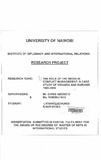| dc.contributor.author | Gachungi, Lydiah | |
| dc.date.accessioned | 2013-05-03T08:34:08Z | |
| dc.date.available | 2013-05-03T08:34:08Z | |
| dc.date.issued | 2002 | |
| dc.identifier.uri | http://erepository.uonbi.ac.ke:8080/xmlui/handle/123456789/18579 | |
| dc.description.abstract | This study focuses on the media's role in conflict management. It examines
various views by scholars on their perception of the media's contribution in
conflict management. What comes out clearly is that the media is an important
factor for good and for ill in conflict management as it plays the roles of both an
agent for or against conflict and its resolution.
The Rwanda and Burundi conflicts in the year 1990-2000 are the case study of
this research. The research examines in particular the radio as the most powerful
medium in most of African countries where the majority of the people are
illiterate and too poor to afford television. It concludes that the radio was the
major media outlet during the conflicts and in particular the National Radio
Rwanda as well as the Radio Television Libres des Mille Collines( RTML).
The research also reveals that there are serious misgivings by the society over
the behaviour of the media outlets particularly during conflicts due to their role
in escalation and expects the media to be part and parcel of conflict resolutions
by creating an environment of peaceful co-existence. In this a number of
recommendations have been suggested on what the media should do to play the
positive role. The study also brings out the fact that media as an active actor in conflict
management is a young phenomenon and its intervention in conflict however is
still in its adolescence. This has been revealed by the lack in depth research in
this field as well as lack of synergy between conflict managers and the media
managers. The study therefore recommends that the media's role therefore
needs to be established and integrated in conflict management strategies both at
the regional level as well as internationally.
In conclusion the study brings out the fact that if concrete measures and
strategies are put in place by the conflict mangers as well as by the international
community on how media should act in conflict situations, the media can be an
effective tool for sending messages about peace, democracy, ethnic tolerance and
methods of alternative conflict resolution. On the other hand if these measures
are not affected, the media will continuously contribute to the worsening of
existing tensions between and within countries by whipping up nationalistic
feelings and ethnic hatred leading to a repeat of the 1994 Rwandan genocide. | en |
| dc.description.sponsorship | University of Nairobi | en |
| dc.language.iso | en | en |
| dc.subject | Conflict management | en |
| dc.subject | Media | en |
| dc.subject | Rwanda | en |
| dc.subject | Burundi | en |
| dc.title | The role of the media in conflict management: a case study of Rwanda and Burundi, 1990-2000 | en |
| dc.title.alternative | | en |
| dc.type | Thesis | en |
| local.publisher | Institute of Diplomacy & International Studies (IDIS) | en |

